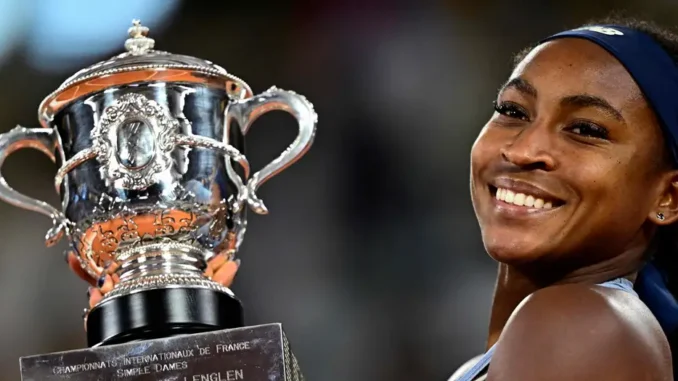
Coco Gauff, the 21-year-old tennis prodigy and world No. 2, has emerged as a powerful voice both on and off the court, using her platform to confront a growing crisis in professional sports: online abuse. Fresh off her French Open triumph in June 2025, where she clinched her second Grand Slam title by defeating Aryna Sabalenka in a thrilling three-set final, Gauff has turned her attention to the darker side of social media. Speaking in Berlin, she called out the “gross” comments she and other athletes endure, urging social media platforms to take decisive action to protect players from the barrage of harassment that has become an all-too-common part of their lives. Her impassioned plea highlights a systemic issue, underscored by a recent report from the Women’s Tennis Association (WTA) that exposed the alarming scale of abuse targeting nearly 500 female players in 2024.
Gauff’s rise to stardom began at 15, when she stunned the tennis world by defeating Venus Williams at Wimbledon in 2019. Since then, her career has soared, with a 2023 US Open title, a 2025 French Open crown, and a WTA Finals victory in Riyadh, cementing her as one of the sport’s brightest stars. Off the court, her advocacy for mental health and social justice, inspired by figures like Michelle Obama, has made her a role model for a new generation. Yet, the relentless vitriol she faces online—often targeting her appearance, her family, or her performance—has been a persistent challenge. “You hear a lot of nasty things, people talk about your appearance, your family’s appearance, and all these things,” Gauff said, reflecting on the toll it takes, especially when compounded by personal mental health struggles. “If you’re already struggling with your own mental issues and then you have people digging deeper, it is tough.”
The WTA’s 2024 report, compiled with data from tech company Signify Group, revealed a staggering 8,000 abusive, violent, or threatening comments directed at 458 players, with a quarter of the abuse concentrated on just five individuals. Much of this venom stems from disgruntled gamblers, with 15 cases escalating to law enforcement involvement. Gauff, who once thought she was uniquely targeted, now recognizes the issue’s pervasiveness. “I just thought at first that I was being targeted. Then I realized everybody was getting it,” she shared, recalling her early days on tour when the negativity felt personal. The report has spurred calls for the gambling industry to crack down on abusive bettors, but Gauff insists social media platforms must also step up. “I would love for some of the social media platforms to get involved, not only when it comes to tennis players. Influencers, other athletes, they all get these comments, so it’s something that can be addressed,” she urged, expressing cautious optimism: “I feel like they can.”
To cope, Gauff has developed strategies to shield herself from the hate. She limits her time on platforms like X, using “burner” accounts to avoid tennis-related negativity, and spends up to 30 minutes blocking abusive users after matches. “I’m not entitled to read negative things about myself. Just as you’re entitled to write that, I’m entitled to block it,” she declared at the 2024 US Open, a stance that resonated with fans and fellow players like Caroline Garcia, who recently shared screenshots of hateful messages following her early tournament exit. Gauff also finds inspiration in positive social media moments, such as a TikTok comment that shifted her mindset before the 2024 US Open. “TikTok does a better job of filtering comments, so you don’t really see it,” she noted, suggesting other platforms could adopt similar measures.
Despite the abuse, Gauff channels negativity into motivation. After her 2023 US Open win, she fired back at detractors, saying, “I know those who were with me and those who weren’t,” and later, after her WTA Finals triumph, she posted on X, “lol safe to say I beat the bad season allegations.” Her resilience, honed through therapy and a focus on redirecting self-doubt into positive affirmations, has been key. “Instead of being like, ‘Oh, what if I lose?’ think about, ‘Oh, what if I win?’” she explained, crediting her therapist for helping her reframe challenges. This mindset carried her through a dramatic French Open final, where she overcame a first-set loss to Sabalenka, who later apologized for post-match comments attributing her defeat to errors rather than Gauff’s skill. “She texted me two or maybe three days ago, she sent a text apologizing,” Gauff revealed, appreciating Sabalenka’s gesture.
As Gauff prepares for Wimbledon 2025, her call to action resonates beyond tennis. The French Open’s use of AI-driven tools like Bodyguard to filter abusive comments offers a glimpse of potential solutions, though Gauff opts for her own filters, limiting messages to long-time followers. Her advocacy, backed by high-profile support from figures like Barack and Michelle Obama, underscores her influence. “Your determination, strength, and grace throughout the French Open has inspired us all,” Michelle Obama posted on X, celebrating Gauff’s latest triumph. By confronting online abuse head-on, Gauff is not just fighting for herself but for all athletes, demanding a safer digital space where talent, not trolls, takes center stage.
Leave a Reply